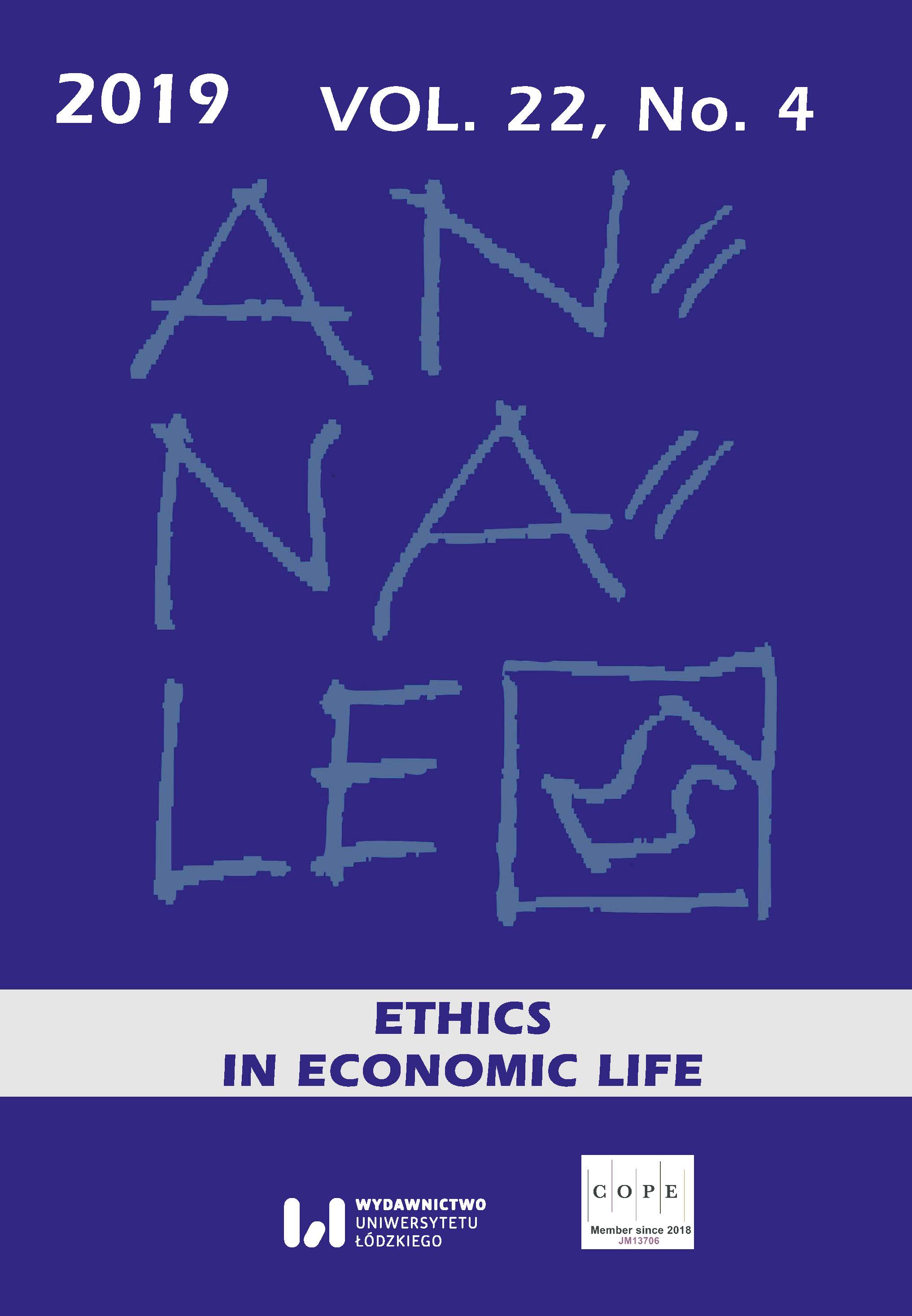Wpływ teorii makroekonomicznych na etyczną jakość praktyki finansowej
DOI:
https://doi.org/10.18778/1899-2226.22.4.01Słowa kluczowe:
animal spirits, causal realism, efficient market hypothesis, financial ethics, institutional entrepreneurshipAbstrakt
The aim of the present paper is to investigate the logical relationship between the prevalence of specific macroeconomic theories and the ethical quality of practices that take place in the financial markets. The main thesis presented herein is that viewing the financial markets through an appropriate economic framework is a crucial prerequisite of maintaining their ethical foundations and harnessing their ethical potential. Three competing macroeconomic visions – the “animal spirits” theory, the efficient market hypothesis, and the causal-realist market process approach – are assessed with respect to their logically deducible effects on the ethical thinking of financial operators. The main conclusion of the paper is that the causal-realist approach provides the most satisfactory account of the inherent conceptual nature of financial markets, thereby furnishing the best guidance for the development of appropriate professional virtues by their key members.
Bibliografia
Akerlof, G., & Shiller, R. (2009). Animal spirits: How human psychology drives the economy, and why it matters for global capitalism. Princeton, NJ: Princeton University Press.
Google Scholar
Alchian, A. (1950). Uncertainty, Evolution, and Economic Theory. Journal of Political Economy, 58(3), 211–221.
Google Scholar
DOI: https://doi.org/10.1086/256940
Bastiat, F. (1998) [1850]. The Law. Foundation for Economic Education: Irvington-on-Hudson, NY.
Google Scholar
Bragues, G. (2012). Neither Efficient nor Animally Spirited, but Eventually Adjusting: The Stock Market According to L.A. Hahn. Quarterly Journal of Austrian Economics, 15(1), 89–119.
Google Scholar
Bruni, L., & Sugden, R. (2013). Reclaiming Virtue Ethics for Economics. Journal of Economic Perspectives, 27(4), 141–164.
Google Scholar
DOI: https://doi.org/10.1257/jep.27.4.141
Campos Dias de Sousa, R.E., & Howden, D. (2015). The Efficient Market Conjecture. Quarterly Journal of Austrian Economics, 18(4), 378–408.
Google Scholar
Caplan, B. (2018). The Case against Education. Princeton, NJ: Princeton University Press.
Google Scholar
Fama, E. (1970). Efficient Capital Markets: A Review of Theory and Empirical Work. Journal of Finance, 25(2), 383–417.
Google Scholar
DOI: https://doi.org/10.2307/2325486
Foss, K., Foss, N., & Klein, P. (2007). Original and derived judgment: An entrepreneurial theory of economic organization. Organization Studies, 28(12), 1893–1912. https://doi.org/10.2139/ssrn.982105
Google Scholar
DOI: https://doi.org/10.2139/ssrn.982105
Foss, N., & Klein, P. (2012). Organizing Entrepreneurial Judgment: A New Approach to the Firm. Cambridge, UK: Cambridge University Press.
Google Scholar
DOI: https://doi.org/10.1017/CBO9781139021173
Friedman, J., & Kraus, W. (2011). Engineering the Financial Crisis: Systemic Risk and the Failure of Regulation. Philadelphia, PA: University of Pennsylvania Press.
Google Scholar
Gertchev, N. (2007). A Critique of Adaptive and Rational Expectations. Quarterly Journal of Austrian Economics, 10(4), 313–329. https://doi.org/10.1007/s12113-007-9023-1
Google Scholar
DOI: https://doi.org/10.1007/s12113-007-9023-1
Hayek, F. (2002). Competition as a Discovery Procedure. Quarterly Journal of Austrian Economics, 5(3), 9–23.
Google Scholar
DOI: https://doi.org/10.1007/s12113-002-1029-0
Henrekson, M., & Sanandaji, T. (2011). The Interaction of Entrepreneurship and Institutions. Journal of Institutional Economics, 7(1), 47–75. https://doi.org/10.1017/S1744137410000342
Google Scholar
DOI: https://doi.org/10.1017/S1744137410000342
Higgs, R. (1987). Crisis and Leviathan: Critical Episodes in the Growth of American Government. New York: Oxford University Press.
Google Scholar
Huelsmann, J.G. (2006). The political economy of moral hazard. Politická ekonomie, 54(1), 35–47. https://doi.org/10.18267/j.polek.544
Google Scholar
DOI: https://doi.org/10.18267/j.polek.544
Huelsmann, J.G. (2016). Cultural Consequences of Monetary Interventions. Journal des Economistes et des Etudes Humaines, 22(1), 77–98.
Google Scholar
Huerta de Soto, J. (2008). The Theory of Dynamic Efficiency. London: Routledge.
Google Scholar
DOI: https://doi.org/10.4324/9780203930601
Kirzner, I. (1992). The Meaning of Market Process. London: Routledge.
Google Scholar
Kirzner, I. (1997). Entrepreneurial Discovery and the Competitive Market Process: An Austrian Approach. Journal of Economic Literature, 35(1), 60–85.
Google Scholar
Machan, T.R. (2007). The Morality of Business. A Profession for Human Wealthcare. New York: Springer.
Google Scholar
DOI: https://doi.org/10.1007/978-0-387-48907-0
Malkiel, B. (2003). The Efficient Market Hypothesis and Its Critics. Journal of Economic Perspectives, 17(1), 59–82.
Google Scholar
DOI: https://doi.org/10.1257/089533003321164958
McCloskey, D. (2010). Bourgeois Dignity: Why Economics Can’t Explain the Modern World. Chicago, IL: University of Chicago Press.
Google Scholar
DOI: https://doi.org/10.7208/chicago/9780226556666.001.0001
Mises, L. (1990). Economic Calculation in the Socialist Commonwealth. Auburn, AL: Ludwig von Mises Institute.
Google Scholar
Mises, L. (2006). The Ultimate Foundation of Economic Science: An Essay on Method. Indianapolis, IL: Liberty Fund.
Google Scholar
Salerno, J.T. (2008). The Entrepreneur: Real and Imagined. Quarterly Journal of Austrian Economics, 11(3), 188–207.
Google Scholar
DOI: https://doi.org/10.1007/s12113-008-9043-5
Salerno, J.T. (2010). Menger’s causal-realist analysis in modern economics. Review of Austrian Economics, 23(1), 1–16.
Google Scholar
DOI: https://doi.org/10.1007/s11138-009-0096-2
Salerno, J.T. (2012). A Reformulation of Austrian Business Cycle Theory in Light of the Financial Crisis. Quarterly Journal of Austrian Economics, 15(3), 3–44.
Google Scholar
DOI: https://doi.org/10.1007/s12113-002-1027-2
Selgin, G., Lastrapes, W., & White, L. (2012). Has the Fed Been a Failure? Journal of Macroeconomics, 34(3), 569–596.
Google Scholar
DOI: https://doi.org/10.1016/j.jmacro.2012.02.003
Stockman, D. (2013). The Great Deformation: The Corruption of Capitalism in America. New York: Public Affairs Press.
Google Scholar
Stringham, E. (2015). Private Governance: Creating Order in Economic and Social Life. Oxford: Oxford University Press.
Google Scholar
DOI: https://doi.org/10.1093/acprof:oso/9780199365166.001.0001
Taleb, N. (2018). Skin in the Game: Hidden Asymmetries in Daily Life. New York: Random House.
Google Scholar
Wiśniewski, J.B. (2018). Etyka gospodarcza jako refleksja nad jakościowym potencjałem działalności ekonomicznej. Annales. Etyka w Życiu Gospodarczym/Annales. Ethics in Economic Life, 21(1), 47–56. https://doi.org/10.18778/1899-2226.21.1.04
Google Scholar
DOI: https://doi.org/10.18778/1899-2226.21.1.04
Pobrania
Opublikowane
Jak cytować
Numer
Dział
Licencja

Utwór dostępny jest na licencji Creative Commons Uznanie autorstwa – Użycie niekomercyjne – Bez utworów zależnych 4.0 Międzynarodowe.









